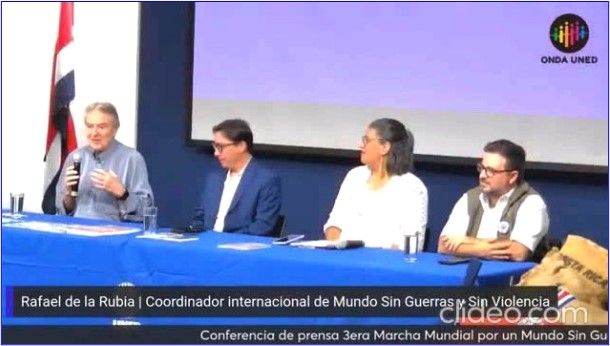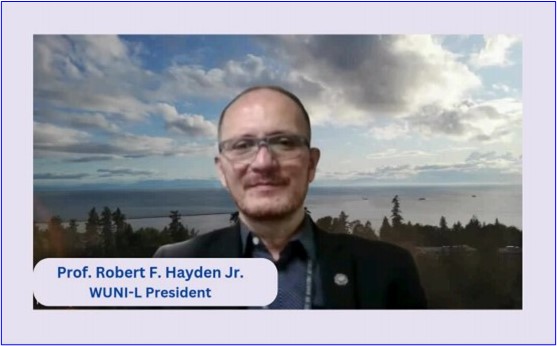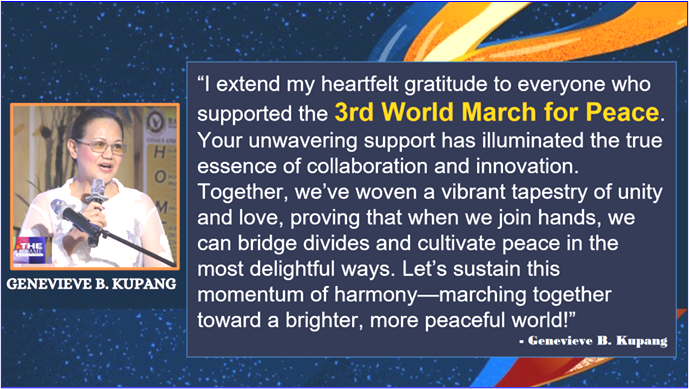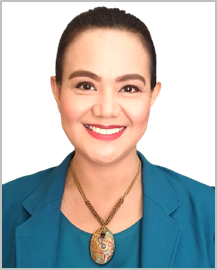(Fourth in a Series)
by Genevieve Balance Kupang
BCU Hosts the 3rd World March for Peace Philippine Leg: A Symphony of Global Harmony
This is the fourth article in a series highlighting the Philippines’ participation in the 3rd World March, which supports UN Sustainable Development Goals (SDGs) #16, #17, and #11. Below are the links to the first, second, and third articles:
- https://www.pressenza.com/2024/10/bcu-hosts-the-3rd-world-march-for-peace-philippine-leg-a-symphony-of-global-harmony/#content;
- https://www.pressenza.com/2024/10/bcu-hosts-the-3rd-world-march-for-peace-philippine-leg-a-symphony-of-global-harmony-2/.
- https://www.pressenza.com/2024/10/global-peace-advocates-alfsen-volta-and-santillan-inspire-at-baguio-central-universitys-3rd-world-march-for-peace/
Rafael de la Rubia, the International Coordinator of the World March (WM) for Peace and Nonviolence, and the Founder of World without Wars and Violence

Participants from BCU in the 3rd World March viewed Rafael de Rubia’s speech delivered at the Universidad Estatal a Distancia (UNED), Costa Rica.
Here are the highlights of Dela Rubia’s message, originally shared in Spanish, now presented in English. He shared a profound message at UNED, emphasizing Costa Rica’s legacy of peace, unity, and positive human progress. Reflecting on Costa Rica’s 1948 decision to abolish its military, he highlighted the nation’s bold step towards peace, which has allowed the country to channel resources into education and quality of life rather than warfare. He noted that this choice stands as a global model, demonstrating that investment in human well-being is a viable alternative to militarization.
He contrasted Costa Rica’s peace-driven priorities with the devastation he’s witnessed in conflict zones worldwide. For example, in some parts of Africa, young children were injured by landmines, relics of past wars, that still endanger civilians. However, he emphasized how technology and international support have enabled the production of prosthetics, offering hope and collaboration to address war’s tragic aftermath.
Further, he commented on the media’s role in amplifying negativity, highlighting how peaceful demonstrations for worker’s rights are overshadowed by the actions of a few disruptive individuals. He argued that this selective focus on violence contributes to a polarized worldview that distorts reality and promotes a false sense of societal decline. Instead, he asserted, civilization is advancing, and most people want to live with dignity and peace, away from conflicts.
De La Rubia pointed out the long-term, intergenerational impacts of war, citing crises in places like Gaza and Ukraine, where children are enduring immense hardships. He stressed that these conflicts leave scars that last for generations, hindering sustainable progress. He urged to shift from the narrative that civilization is a “jungle” where only the strongest survive. Instead, he encouraged recognizing humanity’s capacity for collaboration, empathy, and coexistence.
He reflected on our collective identity as “ H omo sapiens ,” and questioned why humans, unlike other species, plan systematic destruction against their own kind. He urged us to be wise and compassionate, to uphold life rather than endanger it. His message exhorted all to view humanity as interconnected, where collaboration ensures progress for all.
De La Rubia’s Message, Shared by Tiziana Volta, Delivered in Mexico a Week Before BCU’s October 21 Peace Event
“The Nobel Peace Prize awarded to Nihon Hidankyo was long overdue and could not have come at a more crucial time. The Hibakusha—the witnesses and survivors of the atomic bomb—from Nihon Hidankyo have stood among the bravest and most resolute supporters of nuclear disarmament worldwide The organization has remained focused on three fundamental goals: preventing nuclear war, eliminating nuclear weapons, and securing essential medical care for atomic bomb survivors.
Hidankyo was founded in 1956, following the H-bomb test Bravo, a bomb 1,000 times more powerful than the atomic bomb dropped on Hiroshima, which contaminated Japanese fishermen and Marshall Islanders. As Wilfred Burchett, the first Western journalist to witness the destruction and suffering in Hiroshima in 1945, later recounted, despite their unbearable physical and emotional pain, the Hibakusha became one of the world’s most powerful forces advocating for nuclear abolition. With this Nobel Peace Prize, the voices of the Hibakusha, their haunting testimonies, and their truth that humanity and nuclear weapons cannot coexist, will now echo more strongly around the world.”
These words are from De la Rubia, who spoke them in Mexico following the announcement of the Nobel Peace Prize in Sweden on October 11, 2024.
Honoring Our Past and Embracing Hope for the Present and Future
Willa Tecson and Genevieve B. Kupang Connect with Rafael de la Rubia Through Elena Giuffrida, Bridging the Legacy of the 1 st WM to the Ongoing 3 rd WM
In reflecting on the messages shared by Wilfredo Alfsen in the third series of these articles ( https://www.pressenza.com/2024/10/global-peace-advocates-alfsen-volta-and-santillan-inspire-at-baguio -central-universitys-3rd-world-march-for-peace/) , I find a profound connection to the spirit of collaboration and hope that was ignited during our first meeting with Rafael de la Rubia in Milan in 2008 , at the European Humanist Forum dubbed “The Force of Nonviolence.” Alfsen’s insights remind us that despite the paradoxes of our global progress—marked by fewer deaths due to hunger and advancements in education—there remain forces that seek to disrupt our journey toward peace and harmony. His call to reject these divisive influences resonates deeply as we strive to build a world focused on shared prosperity, particularly for our children and future generations.
Simultaneously, Rev. Br. Ramon Caluza’s heartfelt prayer for anger against injustice and the foolishness to believe in our ability to effect change serves as a powerful reminder of our collective responsibility (See full text here: https://www.pressenza.com/ 2024/10/bcu-hosts-the-3rd-world-march-for-peace-philippine-leg-a-symphony-of-global-harmony-2/ ). His words inspire us to transform our tears for those who suffer into actions that foster justice and kindness.
This fourth in a series of articles connects with the past encounter with Rafael de la Rubia, carrying forward the urgent challenge to work tirelessly for peace—not just for ourselves but for the sake of our present and future generations. The spirit of the initial meeting with Rafa, a kindred spirit and a sibling in peacemaking—a “kuya” (older brother)—is very much alive, urging us to unite in purpose and action as we navigate the complexities of our time. Together, we can ensure that the legacy we leave is one of compassion, resilience, and unwavering commitment to a better world.

Bridging the Past (2008) to the Present: A year before the inaugural World March (October 2, 2009-January 5, 2010), Genevieve B. Kupang and Willa Tecson received a briefing from Rafael de la Rubia, facilitated by Serena Pulcini and Elena Giuffrida, their orientors from Trieste, Italy. Photo credit: Elena Giuffrida.

Keeping the Ember Alive: Elena Giuffrida (Trieste), Juha Janne Olavi Uski (France), Matilde Mirabella (Milan), Genevieve B. Kupang (Philippines), Pierpaolo Dutto (Milan), and Marita Simon (Germany). Taken during the European Humanist Forum, 17-19/10/2008, Milan.
As we embarked on the 3rd World March for Peace and Nonviolence, which began on October 2, 2024 and will continue until January 5, 2025, the growing participation of individuals—both young and old—serves as a beacon of hope for the future. Let us embrace this journey with gratitude for our past and optimism for the present and future, recognizing that every step we take brings us closer to a more peaceful and just society.
Prof. Robert Frederick Hayden Jr., President of WUNI-Leaders, Delivers Solidarity Message at BCU
The author of this article had the privilege of meeting Professor Robert Frederick Hayden Jr. during the World University Rankings for Innovation (WURI) Global Conference at aSSIST University in Seoul, held from September 24 to 26, 2024. As fellow members of the Board of Directors for WUNI-Leaders, both Kupang and Hayden embody the spirit of innovation and collaboration. Kupang’s invitation for Hayden to join the 3rd World March for Peace at BCU is more than a gesture of goodwill; it symbolizes their shared commitment to fostering meaningful partnerships and making a significant impact. Together, they are not only discussing change—they are actively marching toward it!

Below is his message of solidarity:
“Warm greetings to the esteemed organizers, faculty, students, and distinguished guests of Baguio Central University’s Peace event. As President of WUNI-Leaders, I am honored to join you today. WUNI-Leaders represent the World University Network for Innovation Leaders —a community of professors, executives in higher education, and counterparts in research institutions, consulting firms, media corporations, and education-related organizations. Together, we are committed to creating societal and industrial impact through innovation, collaboration, and leadership.
Our shared mission aligns with the themes of this peace event, promoting peace, justice, and the integrity of creation. The challenges we face today—whether in conflict, social injustice, or environmental degradation—demand leaders who are not only knowledgeable but also compassionate and visionary. As the international peace movement under UNESCO’s patronage aptly proclaims, “Not by force, but by art.” Art has the unique power to connect us across boundaries, offering new ways to express our shared humanity, resolve conflicts, and promote justice.
In our roles as educators, leaders, and innovators, we must embody these principles, ensuring that peace is not just an ideal but a practice. We must be custodians of the earth, safeguarding its integrity for future generations and building sustainable, just communities where everyone can thrive. To all WUNI leaders and those gathered here today, let us continue to lead with empathy and innovation.
Together, we can create a future where peace and justice are woven into the very fabric of society. Thank you, and may peace be with us all.”
G enevieve B. Kupang’s Sincere Thanks to All Who Supported the 3rd WM
Genevieve B. Kupang, the lead organizer of the 3rd World March extends her deepest gratitude to BCU’s President Dr. Margarita Cecilda Rillera and her family, to VPAA Dr. Elma Donaal and all dedicated departments, colleges, and offices. The active involvement and full support in graciously welcoming the WM representative together with the partners of World without Wars and Violence have been the driving force of the WM Philippine leg.

Genevieve B. Kupang’s Sincere Thanks to All Who Supported the 3rd World March for Peace and Nonviolence.
We have celebrated together our commitment to peace, and for that, we are truly grateful! Watch out for the fifth series!
#Promotionofacultureofpeace
#3rdWorldMarchPhilippineLegatBCU
About the Author:
 Genevieve Balance Kupang is a professor and the Dean of the Graduate School at Baguio Central University. As BCU’s Representative for Internationalization, she plays a role in fostering partnerships and advancing the university’s international presence. She is a Board of Director of the Cordillera Association of International Relations Officers (CAIRO). She serves on the leadership and selection committee for the Exceptional Women of Peace Awards at Pathways to Peace, a UN Peace Messenger organization. She is committed to excellence in education, international relations, and the promotion of peace and empowerment.
Genevieve Balance Kupang is a professor and the Dean of the Graduate School at Baguio Central University. As BCU’s Representative for Internationalization, she plays a role in fostering partnerships and advancing the university’s international presence. She is a Board of Director of the Cordillera Association of International Relations Officers (CAIRO). She serves on the leadership and selection committee for the Exceptional Women of Peace Awards at Pathways to Peace, a UN Peace Messenger organization. She is committed to excellence in education, international relations, and the promotion of peace and empowerment.
